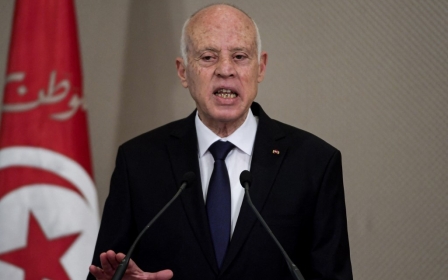Tunisia appoints first woman prime minister - but not everyone is convinced

Following weeks of international and domestic pressure, Tunisian President Kais Saied appointed Najla Bouden Romdhane as prime minister on Wednesday, making her the country's first woman premier, and eliciting reactions from across Tunisia.
In a statement on social media, the presidency tasked Romdhane with forming a new government as quickly as possible, two months after Saied dismissed then-Prime Minister Hichem Mechichi, suspended parliament, and extended his own powers in a move labelled a coup by critics.
First female PM on Tunisia! This is a step forward for us and hopefully a chance for this country to flourish even more!
— Mayssa ^^ ميساء (@MayssaAissawi) September 29, 2021
I couldn't be prouder for being Tunisian!
And: نساء بلادي نساء و نصف 😎🤩 https://t.co/uKFeUvOZG6
Translation: The women of my country are worth a woman and a half
Romdhane, 63, worked as a university professor in engineering and a World Bank programme coordinator for the Ministry of Higher Education and Scientific Research.
Stay informed with MEE's newsletters
Sign up to get the latest alerts, insights and analysis, starting with Turkey Unpacked
In an online video, Saied said her appointment honoured Tunisian women and urged her to propose a cabinet within the next few hours or days, "since we have lost a lot of time".
According to Saied, the main goal of the new cabinet would be to "put a stop to the corruption and disorder that have permeated across numerous governmental institutions".
However, some have viewed the president's selection of a woman prime minister as an attempt to distract from his controversial moves since 25 July.
Saied effectively became the head of government last Wednesday by enacting new decrees redefining the role of the prime minister.
Previously, the premier was accountable to parliament - but now has to answer to the president, who in turn selects cabinet members and determines policy directions and fundamental decisions.
These changes have led some social media users to say that Romdhane might only be a pawn in Saied's efforts to consolidate power.
Translation: She may be a woman - for in other circumstances, I would have been happy to be ruled by a woman - but this doesn't make her less of an accomplice in the coup d'etat, implementing the measures intended to bring down the political regime as prescribed by the constitution!
Others brought up instances across the globe of rulers tokenising women in their governments as symbols of feminism in order to legitimise their autocratic rule.
Translation: Many positions have been given to women in a number of Arab countries recently, especially those ruled by tyrannical regimes or a coup president. But this is nothing more than an attempt to beautify the face of these ugly regimes - just decor. We do not need to deceive anyone.
In 2016, Romdhane was in charge of the execution of “PromESsE,” a $70m World Bank initiative aimed at “modernising” higher education in Tunisia in order to address high levels of unemployment among university graduates.
The initiative was reportedly mishandled; the project led by Romdhane was cited by one 2019 report as "one of the causes behind Tunisia's high cost of living and the country's growing [debt burden], since the leadership gambled millions of euros on foreign banks and mismanaged the loans".
Many people on Twitter remarked on the irony of assigning Romdhane, a close friend of the president's wife, to deal with issues of corruption despite her lack of expertise.
Translation: She has succeeded in making Tunisia bankrupt before she even became prime minister
While the appointment of a new premier was expected, many political parties in the country have called for an end to all extraordinary measures.
In a statement issued on Wednesday, Tunisian deputies urged their elected colleagues to resume parliamentary work on 1 October in order to “determine a road map out of the crisis that is obviously against constitutional legitimacy and the democratic path”.
The declaration, signed by 93 MPs, emphasised that Saied's "special actions are illegal and must be opposed via all democratic means", while asking for all parties to "unite and overcome divisions to preserve the republican and democratic principles".
Following the announcement, MP Ayashi Zamal stated that “the president of the republic's appointment of a prime minister is a good step”, and expressed the hope that Saied would go back on his recent reforms and have the cabinet once again answerable to parliament in order to “give any actions the credibility they require”.
Separately, mainstream Islamist party Ennahda asked the speaker of parliament to work towards resuming the assembly’s work, following weeks of a dormant parliament.
The Tunisian parliament building had been surrounded by barricades since Saied's seizure of powers on 25 July, but the barriers were removed on Wednesday following the naming of the premier, leading MPs to hope that they might return to work soon.
Middle East Eye delivers independent and unrivalled coverage and analysis of the Middle East, North Africa and beyond. To learn more about republishing this content and the associated fees, please fill out this form. More about MEE can be found here.




